Blogger to WordPress: The 6 Important Reasons to Move & Steps to Switch to WordPress
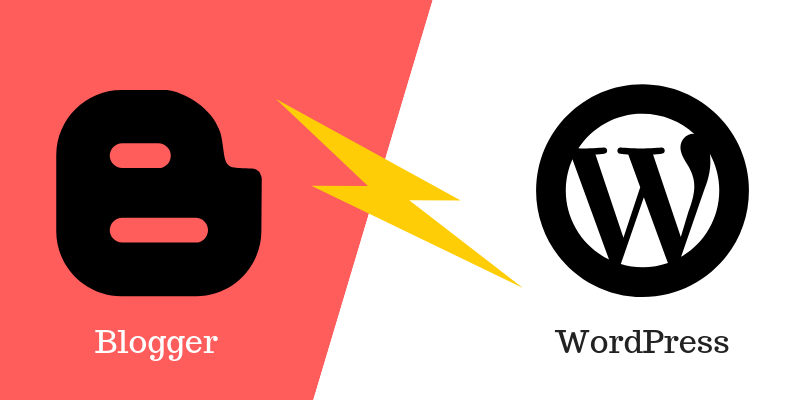
Blogger to WordPress – almost a decade ago, just like every young writer I was looking for an online space where I can express myself, write about my day, or share my knowledge. Till today, everybody searches for a simple yet powerful blogging platform to share their thoughts and ideas with the world.

Today, when people dive into the blogging world, they often get confused between the two undisputed leaders, i.e., the Google’s tool, Blogger, and world’s most famous content management system, WordPress.
In this article, I’m helping you overcome your selection hassle by making you realize the shortcomings of Blogger and showing why WordPress always stands out. Moreover, you’ll find a list of easy steps that will guide you how to move your site from Blogger to WordPress.
- Compare WordPress and Blogger
1.1. WordPress users own and control their site with a complementary domain
Blogger is a free service provided by Google. This technology giant has full rights to shut down the platform or block you from accessing your blog. You are always safe with Google but, when it comes to your personal blog, it may give you a headache. So, would you like to keep your important things safe with you or give them to strangers?
With WordPress, you have complete control over your website from the very moment you start hosting it. It is you who decides for how long to keep your site on the web and whether you want to shut it down or not. You own everything on your site including the data and control what you share with any third-party.
It comes with easy installation and, there are many hosting sites that provides 1-click installation of WordPress. Some providers include a free domain name with the hosting plan with which you can host your blog at some professional domain like yourbusiness.com instead of some long and irrelevant name. You can have a custom domain name at Blogger as well but, for $15 a year.
Switch to WordPress today to have a lot more control over the look, feel, data, and functionality of your site with a complementary domain registration by the best WordPress host
1.2. WordPress – A free and open-source software
The active community of thousands of developers continuously upgrades and improves the CMS of WordPress to meet the user requirements and online trends. Unlike Blogger, WordPress is a free and open-source piece of software that shares the source code with the site owner and, he can work on it to extend the functionality as desired.
On the other hand, Blogger hasn’t shown any development for a long time. The same outdated interface and functionality cannot be just compared with WordPress.
1.3. Blogger gives customization options but, WordPress is almost limitless
When it comes to customization options, WordPress is miles ahead of Blogger. With Blogger, you get a limited number of templates to choose from, that will change the appearance of your site. You can modify the templates to some extent but, you are not allowed to create your own layout. The customization options of Blogger are relatively useful, but you can only play with some customization tools.
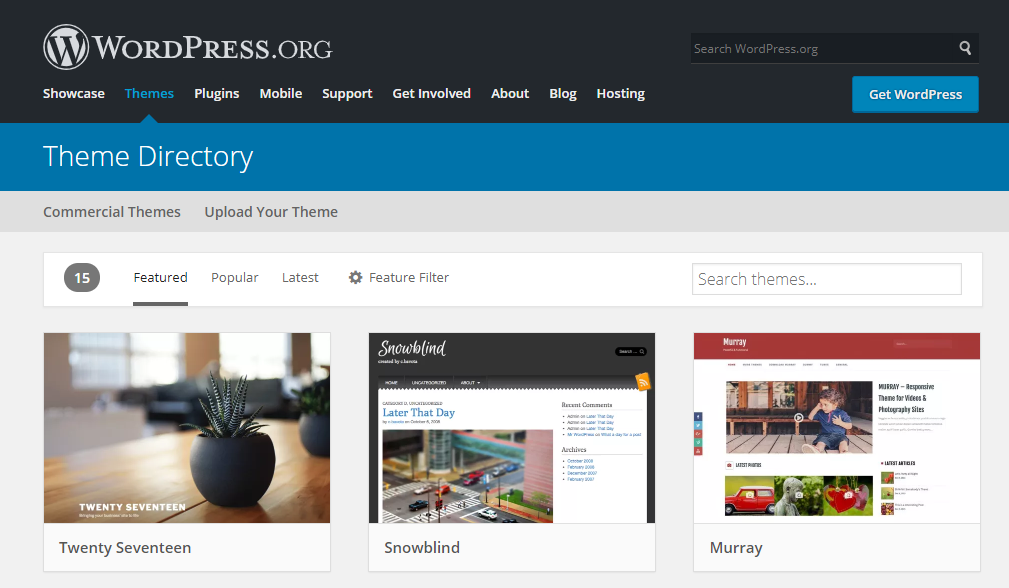
And, WordPress offers thousands of free and premium themes which every site might need to have a professional look. Not only you get themes with additional features but, can modify the source code as well. With countless themes and plugins and the ability to customize as needed, WordPress pushes your blog into the new league.
1.4. Make money with diverse E-commerce options by WordPress and Blogger
When it comes to design an e-commerce store, Blogger and WordPress offer relatively limited choices. WordPress offers several e-commerce plugins and themes to set up an e-commerce store. WooCommerce is the most popular and easy-to-use plugin for WordPress and a product of the same company as WordPress.
With Blogger, money making is possible but only by displaying the ads through Google AdSense. You need to involve third-party e-commerce platforms like Shopify to integrate their selling tools for creating the e-commerce store.
1.5. Blogger brags Google Security but, WordPress plugins are no less
When you use Blogger, you have an added advantage of Google robust, secure platform. That means, since your site is owned and hosted by Google, you are in safe hands. You don’t have to worry about creating backups, securing your data, or managing the server’s resources.
On the other hand, WordPress is a self-hosted solution and, over 25% of the web uses WordPress which makes it the chief target of the hackers. There is WordPress Codex which provides great resources to protect your site in the myriad of ways. Keeping this in focus, the developers have created plenty of plugins to protect your site from malicious attacks.
1.6. Outgrown Blogger’s limited platform? Time to take a wise decision
Blogger and WordPress have their own places and uses for certain types of users. However, in the beginning, you need to figure out the purpose of your site. If you have great plans for your site, want to extend it to an online store with thousands of plugins and themes, then Blogger is not your best bet.
Since a very long time, Blogger has not seen any major development and, this is what that takes it behind. WordPress gives you far more choices when it comes to controlling, security, customization, and content management. Take the time to wonder which platform will better suit your needs.
- How to Move from Blogger to WordPress
Special thanks to the WordPress plugins because of which the process of moving is no more boring. They have brought considerable changes to the platform that helps with this process. However, we tend to choose our sites over the integrated tools these platforms offer. In this guide, we will walk you through step by step how to move your blog from Blogger to WordPress.
2.1. Find the Best Hosting Plan and choose a Domain name
The first thing you need to do while moving from Blogger to WordPress is to sign up with a hosting provider. You need to have a shared web hosting plan from a trustworthy team. Unlike Blogger, the third-party host cannot own your content. Your selected host will not only make the WordPress installation easy but, brings you additional features like unlimited storage space, bandwidth, domain hosting and many more. Below are names of some best hosting providers:
- Godaddy
- Bluehost
- HostGator
- GreenGeeks
- Namecheap
- iPage
- Fatcow
2.2. Export your Blogger blog to WordPress
To export your blog from Blogger, you need to generate an XML file of your content. In your Blogger dashboard, navigate to the Settings page and click on Other links in the navigation menu.
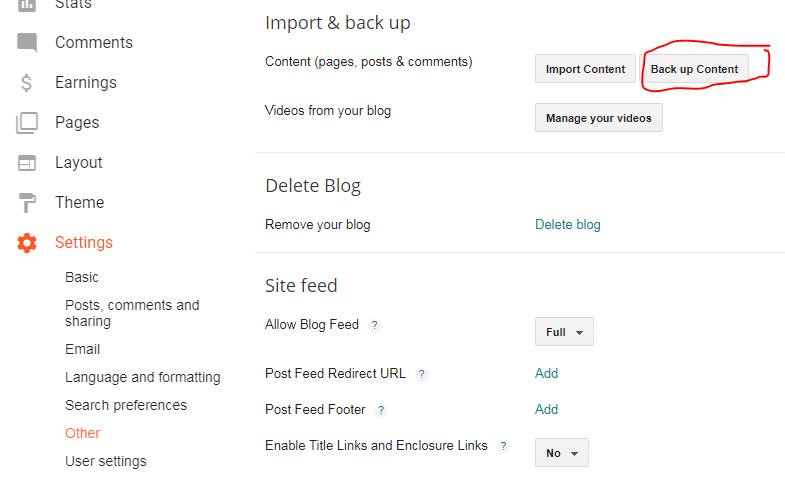
Under the Imports & Back up section, click on the Backup Content button. On clicking this button, you’ll be asked to create a backup of your content into an XML file, which you can be saved to your computer.
2.3. Import Blogger to WordPress
Now, you need to sign in to your new WordPress site and import all the Blogger data you have downloaded. To do this, log into your WordPress dashboard and navigate to Tools > Import on the left-hand sidebar. It will display a list of different platforms from where you can import your data.
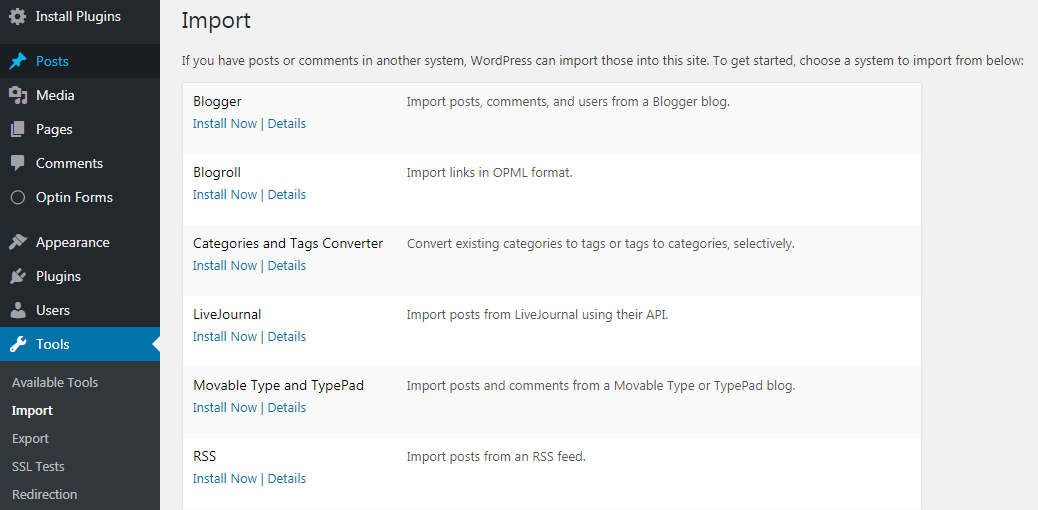
Choose Blogger from that list to install the Blogger importer. Click Install Now to install and activate the plugin. Once you install the plugin successfully, click on the Activate Plugin & Run Importer link.
The next step is to upload the XML file you have exported from Blogger. After uploading your file, you’ll see the WordPress importing all your Blogger data. In the end, you’ll need to assign an author to all your imported posts.
2.4. Set up your Permalinks and Redirect to WordPress Site
Since you have imported all your data from Blogger, you need to ensure that your URLs are identical to those of Blogger’s. Permalink or permanent link is the complete URL to specific pages of your WordPress site.
With WordPress, you are allowed to select a preferred permalink structure for your blog. To choose the structure, go to Settings > Permalinks in your WordPress dashboard. You can add the second, minute, hour, day, month, year, or post name to your site URL.
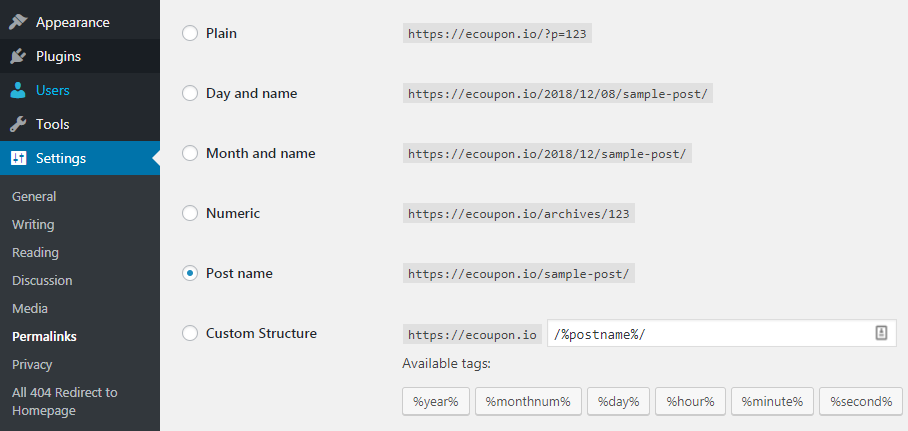
Now, you are done with setting up permalinks, you need to redirect your Blogger posts to your new site. With this, everyone visiting your present links that point to your Blogger posts will be taken to your WordPress site instead. To do this, sign in to your Blogger account. Click Template from the sidebar menu in the Settings and click Revert to Classic Template.
You’ll also need to modify the template HTML code which isn’t a big deal. Just copy the code you got during the configuration and paste it in the Blogger text area and change your xyz.com with your WordPress domain. Click on Save Template to implement the modifications.
<html> <head> <title><$BlogPageTitle
gt;</title> <script> <MainOrArchivePage> window.location.href="http://xyz.com/" </MainOrArchivePage> <Blogger> <ItemPage> window.location.href="http://xyz.com/?blogger=<$BlogItemPermalinkURL
gt;" </ItemPage> </Blogger> </script> <MainPage> <link rel="canonical" href="http://xyz.com/" /> </MainPage> <Blogger> <ItemPage> <link rel="canonical" href="http://xyz.com/?blogger=<$BlogItemPermalinkURL
gt;" /> </ItemPage> </Blogger> </head> <body> <MainOrArchivePage> <h1><a href="http://xyz.com/"><$BlogTitle
gt;</a></h1> </MainOrArchivePage> <Blogger> <ItemPage> <h1><a href="http://xyz.com/?blogger=<$BlogItemPermalinkURL
gt;"><$BlogItemTitle
gt;</a></h1> <$BlogItemBody
gt; </ItemPage> </Blogger> </body> </html> To ensure that your feed subscribers are redirected to your new WordPress site, simply go to Settings > Other on your Blogger dashboard. Under your Site Feed, change your Post Feed Redirect URL to http://xyz.com/feed which is your current WordPress site’s feed address. Now, save your settings and log out of Blogger.
One more redirect is left to create on WordPress. For that, navigate to Theme Editor under the Appearance menu on the right sidebar. Click on Theme Functions to open your functions.php file. Once it is opened, go to the closing PHP tag and paste the following code right before the tag:
function blogger_query_vars_filter( $vars ) { $vars[] = "blogger"; return $vars; } add_filter('query_vars', 'blogger_query_vars_filter'); function blogger_template_redirect() { global $wp_query; $blogger = $wp_query->query_vars['blogger']; if ( isset ( $blogger ) ) { wp_redirect( get_wordpress_url ( $blogger ) , 301 ); exit; } } add_action( 'template_redirect', 'blogger_template_redirect' ); function get_wordpress_url($blogger) { if ( preg_match('@^(?:https?://)?([^/]+)(.*)@i', $blogger, $url_parts) ) { $query = new WP_Query ( array ( "meta_key" => "blogger_permalink", "meta_value" => $url_parts[2] ) ); if ($query->have_posts()) { $query->the_post(); $url = get_permalink(); } wp_reset_postdata(); } return $url ? $url : home_url(); } Now, whenever the visitors click on a link of the former Blogger post, they will be redirected to that same post on your WordPress site.
2.5. Import your Blogger images to WordPress library
Sometimes, there is a possibility that WordPress importer might miss transferring a few images from your Blogger site to the new site. It is one of the problems you might face while switching between platforms. But there are some remedies for sure.
Either, you can go with the drag-and-drop method to add any images that got left out to the relevant page or post. Or, you can ease your pain with some available plugins like Auto Upload Images. All you need to do is to install and, update the plugin and it will scan your posts for links to images that currently exist on your Blogger website. It will then import images to your WordPress media library and update the web address.
- Conclusions – blogger to WordPress
To some people, free is great but, for others, it’s better to invest some money to get a huge return in the long run. Blogger is a simple platform but, not a good option when it comes to long-term sustainability. While WordPress is an open-source software, ideal for building any website.
It offers superior benefits including personalization, control, support, and flexibility. If you are into putting your site to a serious purpose, WordPress is undoubtedly your best bet.


Leave a Reply